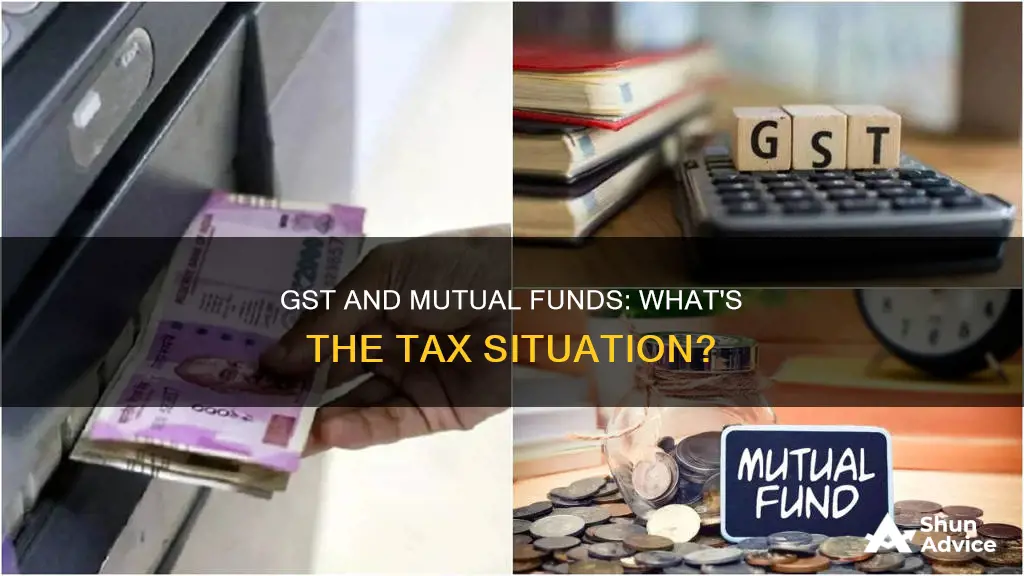
India's biggest tax reform, the Goods and Services Tax (GST), came into effect on July 1, 2017. The new tax regime has raised concerns among mutual fund investors about its potential impact on their investments. As per the available data, all financial services, including banking and mutual fund transactions, will be subject to an 18% GST. However, experts believe that the impact will be marginal, as the current tax rate already stands at 15% in the form of a service tax on these transactions. The increase in the service tax rate from 15% to 18% is expected to make mutual funds slightly more expensive, leading to lower returns in mutual fund schemes. Distributors and agents providing mutual fund services will now bear the burden of the higher tax rate, but those with annual earnings below INR 20 lakhs are exempt from paying GST. Overall, while there may be a slight negative impact on the mutual fund sector due to the introduction of GST, the long-term perspective remains positive.
What You'll Learn

GST on mutual fund investments: Marginal impact
The Goods and Services Tax (GST) is an indirect tax that was introduced in India in July 2017. GST is governed by a GST Council and the Chairman is the Finance Minister of India. The implementation of GST has had temporary negative consequences for various industries, including mutual fund investments. However, the impact is expected to be marginal and positive in the long run.
Mutual fund investors were concerned about how their investments would be affected by the new tax regime. As per the available data, from 1 July 2017 onwards, all financial services, including banking and mutual fund transactions, featured an 18% GST. This was a 3% increase from the previous 15% service tax on these transactions.
This increase in service tax would be reflected in a slightly higher expense ratio for existing mutual fund investments, leading to marginally lower returns at the time of redemption or switching. The burden of GST would primarily fall on the distributors, but not all distributors are liable to pay GST. The government has set a minimum earning limit of Rs. 20 lakhs annually for distributors to be liable for GST. Distributors who earn less than this amount per year must register for GST to avail of tax exemption.
The increase in tax liability may affect the earning capability of mutual fund distributors. The new GST rules stipulate that the service tax must be paid at the place where the service is consumed, which may lead to compliance issues and increased paperwork for distributors with clients across the country. There is also confusion regarding the details of the new rules, and it is not clear if the exemption limit of Rs. 20 lakhs applies to distributors with businesses in multiple locations.
Another issue is that distributors did not previously raise invoices to mutual funds, as central processing units (CAMs) made payments to distributors. Under GST, no credit will be available if invoices are not raised, which could be a major concern for the distribution of credit to mutual funds.
The introduction of GST has also made the sale of securities taxable, resulting in an additional tax on trading securities besides the Securities Transaction Tax (STT). This has enhanced the cost of mutual funds. Investors are now paying higher premiums to invest in mutual funds, and the expense ratio for most schemes and plans offered by mutual fund firms is expected to rise. Seeking advice from a professional investment planner or financial advisor has also become more expensive with the imposition of GST.
In conclusion, while the GST has had a marginally negative impact on mutual fund investments, the overall effect on the Indian economy is expected to be positive in the long run. The GST has replaced several hidden taxes and improved the ease of doing business in India.
What Makes Debentures Attractive for Surplus Fund Investments?
You may want to see also

Service tax increase: From 15% to 18%
The Goods and Services Tax (GST) came into force in India in July 2017. GST is an indirect tax that applies to all products and services, including financial services such as mutual fund transactions.
The service tax increase from 15% to 18% will impact the expenses incurred by Asset Management Companies (AMCs) that affect the scheme's Net Asset Value (NAV). This will result in a higher expense ratio for mutual fund houses across the country. The 18% rate slab, standardised by the government for the financial service industry, means an increased tax liability for mutual fund distributors.
However, the impact of this change will primarily be faced by large distributors. Smaller distributors, earning below ₹20 lakhs per annum, are exempted from the taxes. Distributors earning less than this amount can avail of this exemption by registering for GST. This exemption is only provided to locally operating distributors, while those functioning at multiple locations will have to bear the consequences of the increased service tax.
The service tax on mutual funds, as per the new GST law, has to be paid at the place where the service is consumed. This change will result in a slight increase in the expense ratio for existing mutual fund investments, decreasing returns at the time of redemption or switching in a proportionate and marginal manner.
Despite the rise in the expense ratio, mutual funds remain one of the best investment options, offering positive growth and better returns compared to other traditional forms of investment.
Invest in ICICI Prudential: A Balanced Fund Guide
You may want to see also

Distributors and GST: Earning limit of Rs. 20 lakhs for exemption
The Goods and Services Tax (GST) was introduced in India in July 2017. It is a multi-stage tax that is levied on each stage of the manufacturing process, from the purchase of raw materials to the sale to the final customer. The GST Council governs it, and the Chairman is the Finance Minister of India.
GST has slab rates of 0%, 5%, 12%, 18% and 28%. The tax rate for financial services, including mutual fund transactions, is 18%. However, the burden of GST is primarily the liability of the distributors, and not all distributors are liable to pay GST. The government has set an earning limit of Rs. 20 lakhs annually for distributors to pay GST. This provides relief for smaller distributors who operate from a single office within a local area. Distributors who earn commission income below this threshold are exempt from paying GST. It is important to note that this exemption applies irrespective of the state and whether the distributor is providing intrastate or interstate services.
To avail of this exemption, distributors must be mandatorily registered for GST. They should include commission income from all financial products, such as insurance, stock broking, and mutual funds, to calculate their annual income. If a distributor has already obtained GST registration, they can cancel it if their annual income is less than Rs. 20 lakhs. Distributors can do this by visiting the GST website and clicking on 'cancellation of provisional registration'. They will need to provide their GST registration number, email address, and other relevant details.
Distributors earning less than Rs. 20 lakhs annually should cancel their GST registration to avoid paying GST on their commission income. Even if they have a GST registration number, they will be liable to pay GST from Re.1 if they do not cancel their registration. Distributors can reduce their GST liability by availing of input tax credits.
A Guide to Investing in the Philequity PSE Index Fund
You may want to see also

GST and compliance: Paperwork and registration
The Goods and Services Tax (GST) is an indirect tax that was introduced in India in July 2017. It is a multi-stage tax, levied at each stage of the supply chain, from the purchase of raw materials to the sale to the final customer. The standard GST rate for most financial services, including mutual fund transactions, is 18%. This is a 3% increase from the previous service tax rate of 15%, and will be reflected in a slightly higher expense ratio for mutual fund investments, resulting in marginally lower returns.
However, the burden of GST will primarily be a liability for distributors, and even then, only for those whose earnings exceed the minimum threshold of 20 lakh rupees annually. Distributors who earn less than this amount per year will be exempt from paying GST, but to avail of this benefit, they must be mandatorily registered for GST. This requirement is expected to lead to increased paperwork and compliance issues for distributors, particularly those with businesses in multiple locations.
The GST registration process can be completed online via the GST portal. The following documents are required for GST registration:
- PAN of the applicant
- Proof of business registration or incorporation certificate
- Identity and address proof of promoters/directors with photographs
- Address proof of the place of business
- Bank account statement/cancelled cheque
- Letter of authorization/board resolution for authorized signatory
GST registration is mandatory for businesses with a turnover above certain thresholds (40 lakh, 20 lakh, or 10 lakh rupees). Failure to register incurs penalties. The registration process usually takes 2-6 working days, and can be expedited with the assistance of tax professionals.
A Simple Guide to Mutual Funds: Investing Your First $100
You may want to see also

Overall impact: Positive in the long run
The implementation of GST in India in 2017 has had a moderately negative impact on mutual funds, with a slight increase in costs for investors. However, the overall impact on the economy is expected to be positive in the long run.
The introduction of GST has caused temporary issues for various industries, but the long-term outlook is positive. This is especially true for sectors such as automobile and transportation, logistics, FMCG, and real estate, which are also sectors that mutual funds invest in heavily.
The automobile industry in India, for example, has benefited from a reduced tax burden on end consumers, and importers and dealers can now claim GST paid on goods, which was not possible previously. GST has also helped manufacturers procure auto parts at lower costs.
The logistics sector has traditionally been plagued by issues such as complicated networks, high coordination costs, inefficient supply chains, and deficient infrastructure. GST has replaced multiple state VATs, helping firms redesign supply chains, centralize hub operations, and take advantage of economies of scale.
The fourth-largest sector in the Indian economy, FMCG, has also seen gains for some companies due to GST. While some tax rates are higher under GST, others are lower, and GST has helped by readjusting tax brackets and reducing distribution costs.
In the real estate sector, the GST rate on under-construction projects remains at 12%, and the impact of GST is limited to cost structure and input credit availability.
While some sectors are facing higher costs due to GST, the overall impact on the mutual fund sector is only slight, and the long-term outlook is positive. With GST and other reformative measures, India's economy is poised for growth, and investing in mutual funds is one of the best ways to benefit from this growth.
Index Funds: A Smart, Safe Way to Invest and Grow Wealth
You may want to see also
Frequently asked questions
Yes, GST will have a marginal impact on mutual fund investments. The increase in service tax from 15% to 18% will make mutual funds slightly more expensive. This will lead to lower returns in mutual fund schemes.
GST will be levied at a rate of 18% on all financial services, including mutual fund transactions. However, the burden of GST will primarily be a liability for the distributors and not all distributors are liable to pay GST. Distributors earning less than Rs. 20 lakhs per year will be exempt from paying GST.
GST has replaced the multiple taxes that were previously applicable, such as excise, VAT, sales tax, etc. The importers and dealers can now claim GST paid on goods imported or sold, which was not possible previously. This has reduced the tax burden on these entities, but it has also increased the cost of mutual fund distribution.
The introduction of GST has led to a more standardized national market in India. Mutual fund distributors whose annual commission earnings are less than INR 20 lakhs are exempted from registration. The tax rate has increased from 15% to 18%, making the mutual fund industry slightly more expensive. This additional cost may be passed on to investors, but the overall impact of GST on the mutual fund sector is expected to be positive in the long run.







